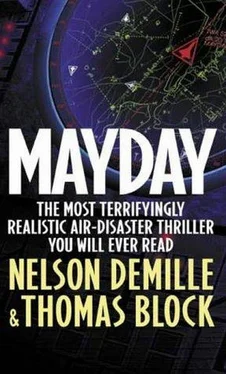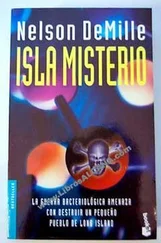Nelson DeMille - Mayday
Здесь есть возможность читать онлайн «Nelson DeMille - Mayday» весь текст электронной книги совершенно бесплатно (целиком полную версию без сокращений). В некоторых случаях можно слушать аудио, скачать через торрент в формате fb2 и присутствует краткое содержание. Жанр: Триллер, на английском языке. Описание произведения, (предисловие) а так же отзывы посетителей доступны на портале библиотеки ЛибКат.
- Название:Mayday
- Автор:
- Жанр:
- Год:неизвестен
- ISBN:нет данных
- Рейтинг книги:4 / 5. Голосов: 1
-
Избранное:Добавить в избранное
- Отзывы:
-
Ваша оценка:
- 80
- 1
- 2
- 3
- 4
- 5
Mayday: краткое содержание, описание и аннотация
Предлагаем к чтению аннотацию, описание, краткое содержание или предисловие (зависит от того, что написал сам автор книги «Mayday»). Если вы не нашли необходимую информацию о книге — напишите в комментариях, мы постараемся отыскать её.
Mayday — читать онлайн бесплатно полную книгу (весь текст) целиком
Ниже представлен текст книги, разбитый по страницам. Система сохранения места последней прочитанной страницы, позволяет с удобством читать онлайн бесплатно книгу «Mayday», без необходимости каждый раз заново искать на чём Вы остановились. Поставьте закладку, и сможете в любой момент перейти на страницу, на которой закончили чтение.
Интервал:
Закладка:
His company, Taylor Metals, owned a four-seat Cessna Twin Skymaster for the sales staff, and if Berry had any real interest left, flying was it. He supposed that flying was mixed up somehow with his other problems. If he found the earth more tolerable, he might not grab every opportunity to fly above it.
Berry turned toward the rear of the first-class cabin. He saw that the lavatories were vacant. He looked at his wristwatch. He had time to wash up and comb his hair before Sharon returned.
On his way to the rear of the cabin, Berry glanced out the window again. He marveled at the enormous size and power of the giant airliner’s engines. He marveled, too, at the solitude of space. What he failed to notice was that they were not alone. He did not see the tiny dot against the horizon that was rapidly approaching the Straton airliner.
Lieutenant Peter Matos held the F-18’s control stick with his right hand. He inched the power levers slightly forward. The two General Electric engines spooled up to a higher setting. Matos continued to fly his Navy fighter in wide, lazy circles at 54,000 feet. He held the craft’s airspeed constant at slightly less than Mach 1. He was loitering, flying nondescript patterns inside a chunk of international airspace known to his country’s military as Operations Area R-23. He was waiting for a call from Home. It was overdue and he was just beginning to wonder about it when his earphones crackled with the beginning of a message. It was the voice of Petty Officer Kyle Loomis, whom Matos vaguely knew.
“Navy three-four-seven, this is Homeplate, over.”
Matos pressed a button on the top of his control stick. “Roger, Homeplate. Three-four-seven. Go ahead, over.” He began another turn through the tranquil Pacific sky.
The voice of the electronics mate in Room E-334 carried loud and clear. “The target has been released. We estimate an initial in-range penetration of your operational area within two minutes. Operation status is now changed to Foxtrot-alpha-whiskey. I say again, Foxtrot-alpha-whiskey.”
“Roger, Homeplate. I read Foxtrot-alpha-whiskey.” Matos released the transmit button and simultaneously pulled back on the control stick. Foxtrot-alpha-whiskey. Fire-at-will. He would never see the target, the hit, or the destruction except on his radar, yet the predator’s stimuli were there and his heart beat faster. The F-18 tightened its turn, and Matos felt the increase in G forces as he accelerated around the remainder of the circle he had been flying. He leveled the fighter on a northeasterly heading and spooled up the engines again. He felt like a knight charging into the field to do battle.
Peter Matos, like most military men who were not born in the continental United States, was more loyal, more patriotic, more enthusiastic than the native-born Americans. He had noticed this right from the beginning. Wherever the flags of the American military had flown-Germany, Guam, the Canal Zone, the Philippines-young men had rallied to those flags. There was also the Cuban officer subculture, the Mexicans, the Canadians, and others who saw the American armed forces as more than a military organization, more than a necessary expense, or just an organization you sent your tax money to, but never your sons. To men like Pedro Matos, who came out of the most abject poverty that his homeland, Puerto Rico, had to offer, the military was home, family, friends, life itself.
Matos worked hard at his duties, studied his manuals, watched what he said, never bucked the chain of command, expressed opinions only when asked, and carried out all orders with enthusiasm and without hesitation. Outwardly, he was sure he was getting it all right, but inwardly, he prayed to San Geronimo that he wouldn’t be passed over for promotion. One pass-over could mean the end of his military career, especially in a peacetime Navy.
Loomis’s voice jarred him out of his reverie. “Navy three-four-seven, do you have target acquisition?”
Matos glanced down at his radar screen. “Negative, Homeplate.”
“Roger, Navy. Keep us informed.”
“Will do.” Matos kept an eye on the radar screen as he let his mind drift back to the larger problems. Matos was certain that the results of this test would determine how the rest of his life would run. The test was secret. That much he was told. It was also illegal. That much he had figured out for himself. What he could not figure out was why they had chosen him to fire this missile.
The new AIM-63X Phoenix missiles rode on the belly mounts of his F-18. For this test, the missiles were fitted with dummy warheads of stainless steel and titanium, and the target was a supersonic military drone launched several hundred miles away by a Navy C-130 Hercules turboprop. Except for those facts, thought Matos, he could have been aiming a pair of live missiles at an attacking Tupolev bomber or a Chinese MiG-21. Of course, both Russia and China were friends of the United States at the moment-but like most military people, Matos knew that friends like these could turn into foes in a heartbeat.
Matos glanced down at his radar screen. No target yet. Today’s mission was a maximum-range exercise to test the updated maneuverability of the new weapon. The radar’s normal 200-mile range had been modified to accept a 500-mile limit. Once launched, the new Phoenix would require none of his usual follow-through guidance. His orders were to fire the first missile, wait for it to stabilize, fire the second missile, then turn 180 degrees and proceed at top speed away from the combat area. The new self-guidance system would seek out the target and continue to track it with no further assistance from Peter Matos.
Tactically, this missile was much safer for a combat pilot. Before the enemy craft knew they had been attacked, the fighter was gone. Matos wasn’t sure he liked this innovation. It called for less personal skill than guiding the missile from the F-18, and it was not as… manly… as remaining in the area. Too, there was no longer even a remote possibility of seeing the hit. But none of that was his business.
He focused on the radar. An electronic blip began to track across the outer fringes of his screen. He pressed the radio button on his control stick. “Homeplate. Three-four-seven has preliminary target acquisition.” His voice was cool, almost laconic. He smiled at the image of those German and Japanese pilots on the late-night movies screaming into their aircraft’s radio, while the American and British pilots always sounded so bored as their craft was falling apart around their ears. Cool. “Do you copy, Homeplate?”
“Roger, three-four-seven. Preliminary target acquisition. Proceed. Out.”
Lieutenant Matos punched a console button, then raised his eyes toward the firing control processor. An electronic symbol slewed to the target’s blip. Matos watched the screen for a few seconds. Suddenly, another blip appeared. Matos blinked. He looked again. The second blip looked weaker and smaller. It was directly behind the first one. False image, Matos thought. Some screwy transistor or diode a tenth of a degree too warm. Something like that. He’d experienced these electronic aberrations before. So had most of the fighter pilots in his squadron. Glitches, or angels, they were called. False images. Echoes. Bounceback. Reflections from some other radar set. Reflections from the surface of the sea. Apparitions with no more substance than a vapor cloud. Vaporware, in the parlance of modern-day computer-speak.
Matos pressed a button on his console. He twisted a knob to adjust the screen’s resolution setting. The aft target began to fade. Then it disappeared. It appeared to have merged with the original, stronger blip, which he was certain was the target. He pressed his radio talk button. “Homeplate, Navy three-four-seven has the target in good resolution. Distance is four hundred and eighty miles. Over.”
Читать дальшеИнтервал:
Закладка:
Похожие книги на «Mayday»
Представляем Вашему вниманию похожие книги на «Mayday» списком для выбора. Мы отобрали схожую по названию и смыслу литературу в надежде предоставить читателям больше вариантов отыскать новые, интересные, ещё непрочитанные произведения.
Обсуждение, отзывы о книге «Mayday» и просто собственные мнения читателей. Оставьте ваши комментарии, напишите, что Вы думаете о произведении, его смысле или главных героях. Укажите что конкретно понравилось, а что нет, и почему Вы так считаете.












